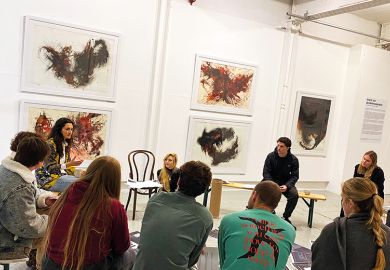The University of Warwick will spend £700 million on its West Midlands campus, including a.new science and engineering precinct.
In one of the largest infrastructure commitments by a UK university in recent years, the Russell Group institution will create 34,500 square metres of new teaching space and laboratories, while some of its existing buildings – several of which go back to the 1960s – will be knocked down.
In addition, more green spaces will be created, while “excessive” car parking will be removed, according to plans approved by local authorities this summer.
Warwick, which has about 28,000 students, has said it expects its undergraduate numbers to grow naturally by 16 per cent over the next decade, while overall full-time student numbers will climb by 40 per cent.
The plans for the £425 million science and engineering campus were initially unveiled last November, although financial details of the STEM Connect expansion, which will total £700 million once spending on new social sciences buildings, educational programmes and research, were released only on 16 October.
Further plans related to new buildings for social science teaching, known as Social Sciences Connect, will be unveiled later this year as building work expected to last a decade starts on the STEM complex.
It is likely to be one of the biggest UK university building programmes announced recently, ahead of the £200 million being spent by the University of Oxford on its Life and Mind Building – the university’s largest building project ever – while the University of Northampton’s £330 million Waterside campus was opened in 2018.
While the University of Cambridge confirmed last year that it will spend about £680 million on estates over the next four years, university infrastructure spending is thought to be significantly down on previous years, with some £8.8 billion spent by higher education institutions in the five years up to 2018, according to figures collated by the Architects Journal.
Stuart Croft, Warwick’s vice-chancellor, said the investment “reaffirms our commitment to making a better world together through our research, education and innovation”.
“The Connect Programme demonstrates how we are fostering curiosity and creativity and creating a lasting impact for years to come. We will equip our students, researchers and partners to tackle the urgent global challenges of today and tomorrow,” he said.
On the financing of the project, he added: “We have carefully managed our finances and have strategically planned our investments to ensure long-term growth and stability in delivering world-leading education and research. Our governing body has rigorously reviewed our plans for the Connect Programme, and we are poised for steady growth.
“As part of this commitment to grow, we have pointed the way ahead by diversifying the way in which we run the university. This diversification – from online businesses to commercial ventures such as Warwick Conferences and the Science Park, generates income, creates jobs for our students and the wider community, and drives economic growth,” added Professor Croft.
“It is important we invest in our campus, through the Connect Programme, to enable further collaboration and interdisciplinary teaching and research opportunities that benefit our students, staff and wider society.”
Mark Williams, academic director for the STEM Connect Programme, said: “Through the STEM Connect Programme, we will firmly maintain the University of Warwick’s position as a global powerhouse for STEM, that will pave the way for groundbreaking research and education.
“The programme will also provide access to state-of-the-art facilities that will deliver both innovation and societal impact.”


